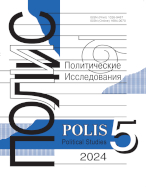Political basis of the city:
capability problems of the inner-city municipalities in contemporary Russia
Trudolyubov A.S.,
HSE University, Moscow, Russia, caiiiatr@mail.ru
elibrary_id: 1059512 | ORCID: 0000-0002-7845-3371 | RESEARCHER_ID: AAH-3422-2021
DOI: 10.17976/jpps/2022.01.10
Trudolyubov A.S. Political basis of the city: capability problems of the inner-city municipalities in contemporary Russia. – Polis. Political Studies. 2022. No. 1. https://doi.org/10.17976/jpps/2022.01.10
The article was prepared with the financial support of the Russian Foundation for Basic Research, project No. 17-03-00566 “Settlement level of local government in Russia: political status and problems of development”.
The article examines the political capacity of the intra-urban municipalities in the Russian Federation. The author focuses on both cities of federal significance and urban districts with intracity division. The article provides a comparative analysis of municipalities in terms of their ability to perform the essential functions of local self-government: to protect the local communities’ autonomy, aggregate and represent their interests, and provide for their basic needs. The author studied the institutional organization and activities of municipalities according to several criteria: territorial organization, the distribution of powers and their financial support, the formation of the local self-government bodies’ staff and interaction with the city-level of government. The author concludes that the innercity municipalities, having formal characteristics similar to urban districts, nevertheless more closely resemble the settlement level of local self-government. They are characterized by institutional weakness and financial dependence on the city-level of government. At the same time, their only significant function is their role in the formation of city-level authorities. This creates a situation of control by the city authorities over the local electoral process, expressed in the filling of local representative bodies with administratively controlled deputies. Also, business interests were identified in elections in urban districts with intra-city divisions, motivated more by the possibility of delegation to the city representative body, than by the powers and resources possessed by intracity areas. The findings of the article point to the weak political subjectivity of the institute. Currently, direct work as a local authority is not its main functional role and has value for all interested actors exclusively in conjunction with the citywide level. The author concludes that there is a low probability of further spread and development of the institution in its current form.
References
Dowding, K., Dunleavy, P., King, D., Margetts, H., & Rydin, Y. (1999). Regime politics in london local government. Urban Affairs Review, 34(4), 515-545. https://doi.org/10.1177/10780879922184068
Frye, T., Reuter, O., & Szakonyi, D. (2014). Political machines at work voter mobilization and electoral subversion in the workplace. World Politics, 66(2), 195-228. https://doi.org/10.1017/S004388711400001X
Gorokhovskaia, Y. (2019). What it takes to win when the game is rigged: the evolution of opposition electoral strategies in Moscow, 2012-2017. Democratization, 26(6), 975-992, https://doi.org/10.1080/13510 347.2019.1577380
Keating, M. (1995). Size, efficiency and democracy: consolidation, fragmentation and public choice. In Theories of Urban Politics (p. 117-134). London: Sage Publications.
Lankina, T. (2002). Local self-government and titular control in Russia’s republics, 1991-1999. The Carl Beck Papers in Russian and East European Studies, 1602, 1-33. https://doi.org/10.5195/cbp.2002.91
OECD. (2017). Multi-level governance reforms: overview of OECD country experiences. Paris: OECD Publ. https://dx.doi.org/10.1787/9789264272866-en
Sharpe, L.J. (1970). Theories and values of local government. Political Studies, 18(2), 153-174. https://doi.org/10.1111/j.1467-9248.1970.tb00867.x
Szakonyi, D.S. (2018). Businesspeople in elected office: identifying private benefits from firm-level returns. American Political Science Review, 112(2), 322-338. https://doi.org/10.1017/S0003055417000600
Babichev, I.V. (2014). Current topics relating to territorial and institutional organization of local self-government. Local Law, 1, 3-14. (In Russ.)
Babun, R.V. (2014). The question about intracity municipalities. Local Law, 5, 3-8. (In Russ.)
Gel’man, V.Y. & Ryzhenkov, S.I. (2010) Local regimes, city governance and “vertical of power” in modern Russia. Political Expertise Journal, 6(4), 130-151. (In Russ.)
Ledyaev, V.G. (2008). Political regimes in cities communities: theory and practice of the empirical researches. Political Science (RU), 3, 32-60. (In Russ.)
Ledyaev, V.G. (2012). Sotsiologiya vlasti. Teoriya i opyt empiricheskogo issledovaniya vlasti v gorodskikh soobshchestvakh [Sociology of power. Theory and practice of the empirical research of power in cities communities]. Moscow: HSE Publ. (In Russ.)
Markvart, E.H. (2013). Modern municipality – fabric of service or platform for the civil society? Municipal Power, 3, 73-82. (In Russ.)
Turovsky, R.F. (2015). Local self-government in Russia and evolution of the political regime. Pro Nunc. Modern political processes, 1, 82-98. (In Russ.)
Turovsky, R.F. (2018a). Analiz effektivnosti raboty sovetov deputatov vo vnutrigorodskikh munitsipal’nykh obrazovaniyakh goroda Moskvy v yanvare 2018 goda [Analysis of the effectiveness of the local councils work in the Moscow intracity municipalities in 2018 January]. Moscow: HSE Lab for regional political studies. (In Russ.) https://clck.ru/Z57Ej
Turovsky, R.F. (2018b). Settlement-level of the local self-government in Russia: social functions and financial capabilities. South-Russian Journal of Social Science, 4, 69-91. (In Russ.)
Turovsky, R.F. & Vaselenko, O.S. (2019). Current State and Prospects of Development of Municipal Self-Government in Big Cities. Russian Journal of Regional Studies, 1, 100-121. (In Russ.) https://doi.org/10.15507/2413-1407.106.027.201901.100-121
See also:
Turovsky R.F.,
Russia’s Local Self-Government: the Agent of the Government in the Trap of Insuffi cient Funding and Civil Passivity. – Polis. Political Studies. 2015. No2
Offerdal A.,
On Nordic Local Government - Development and Prospects. – Polis. Political Studies. 1999. No2
Turchenko M.S.,
Instruments of subordination and the quality of public goods provision: case-study of Petrozavodsk, 2016-2021. – Polis. Political Studies. 2023. No3
Shkel S.N.,
Political Attitudes of Local Elites in Contemporary Russia (Cases of Municipalities of the Perm Territory). – Polis. Political Studies. 2020. No6
Gavrilov G.A.,
Some Particular Features of the Elections in Several-Members Districts. – Polis. Political Studies. 2006. No4





.jpg)






 print
print
.jpg)
.jpg)